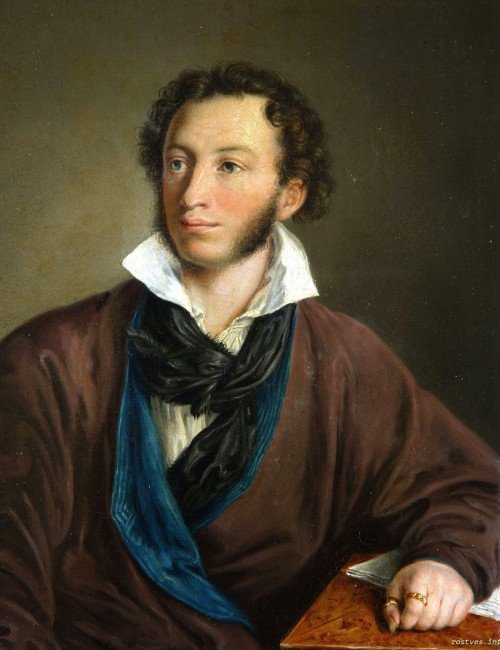
Alexander Sergeyevich Pushkin is widely regarded as one of Russia's greatest poets and writers of all time. Born in 1799 in Moscow, Pushkin was the first Russian author to gain worldwide recognition and acclaim for his literary works. His contributions to the development of modern Russian literature have been compared to that of William Shakespeare and Dante Alighieri. In this blog post, we will take a closer look at Pushkin's life, works, and legacy.
Early Life and Education
Pushkin was born into a noble family, with his father being a minor government official and his mother being the granddaughter of an African prince who had been brought to Russia as a slave. His paternal ancestors were Russian nobility who had been granted lands and titles by the Tsar. As a child, Pushkin was educated at home by private tutors and his parents, who encouraged his love for literature and poetry.
In 1811, Pushkin enrolled in the Imperial Lyceum in Tsarskoye Selo, an elite boarding school for boys that was founded by Tsar Alexander I. The Lyceum was known for its rigorous academic program and its emphasis on the study of classical languages, literature, and history. During his time at the Lyceum, Pushkin developed a reputation as a brilliant student and a talented writer. He began to write poetry and prose, often drawing on the traditions of the Romantic movement, which was then sweeping across Europe.
Early Works
Pushkin's early works were heavily influenced by the Romantic movement, with their focus on nature, emotion, and individualism. His first major work, the poem "Ruslan and Lyudmila," was published in 1820 and quickly became a sensation. The poem, which tells the story of a brave warrior who rescues a beautiful princess from a wicked sorcerer, was praised for its lyrical beauty, vivid imagery, and inventive use of language.
In 1825, Pushkin published his first collection of poems, entitled "Evening." The collection included many of his most famous poems, such as "The Bronze Horseman," "The Fountain of Bakhchisarai," and "The Gypsies." These works cemented Pushkin's reputation as a master of Romantic poetry, and they continue to be celebrated for their passionate lyricism, vivid imagery, and innovative use of language.
Later Works
In the 1830s, Pushkin began to experiment with different literary forms and genres. He wrote historical novels, such as "The Captain's Daughter," which tells the story of a young soldier who falls in love with a noblewoman during the Pugachev Rebellion of 1773-1774. He also wrote plays, such as "Boris Godunov," which tells the story of the rise and fall of the Russian tsar Boris Godunov.
Pushkin's later works are notable for their realism, psychological depth, and social commentary. He wrote about the struggles of ordinary people, the injustices of the legal system, and the corrupt practices of the Russian government. His novel "Eugene Onegin," which was published in serial form between 1825 and 1832, is considered his masterpiece. The novel tells the story of a bored and cynical young aristocrat who rejects the love of a beautiful young woman, only to realize too late the depth of his own feelings.
Alexander Pushkin's later works are widely regarded as some of the most significant contributions to the development of modern Russian literature. In this blog post, we will take a closer look at Pushkin's later works and examine their themes, styles, and legacies.
Pushkin's Shift Towards Realism
Pushkin's early works were heavily influenced by Romanticism, with their emphasis on emotion, nature, and individualism. However, in the 1830s, Pushkin began to shift towards a more realistic style of writing. He began to write about the struggles of ordinary people, the injustices of the legal system, and the corrupt practices of the Russian government. This shift was partly influenced by the rise of the realist movement in European literature, which emphasized the importance of depicting the world as it really was, without romanticizing or idealizing it.
One of Pushkin's most famous works from this period is the novel "Eugene Onegin." Published in serial form between 1825 and 1832, "Eugene Onegin" is considered Pushkin's masterpiece. The novel tells the story of a bored and cynical young aristocrat, Eugene Onegin, who rejects the love of a beautiful young woman, Tatyana, only to realize too late the depth of his own feelings. The novel is notable for its psychological depth, its realistic portrayal of Russian society, and its exploration of themes such as love, identity, and destiny.
Another notable work from this period is the historical novel "The Captain's Daughter." Published in 1836, the novel tells the story of a young soldier, Pyotr Grinyov, who falls in love with a noblewoman during the Pugachev Rebellion of 1773-1774. The novel is notable for its vivid portrayal of historical events, its exploration of themes such as loyalty and honor, and its critique of the abuses of power and the injustices of the legal system.
Pushkin's Plays
In addition to his poetry and prose, Pushkin also wrote several plays during his later years. These plays are notable for their exploration of historical themes and their use of language and dramatic structure.
One of Pushkin's most famous plays is "Boris Godunov," which was written in 1825 and first performed in 1870, after Pushkin's death. The play tells the story of the rise and fall of the Russian tsar Boris Godunov, who comes to power after the death of Ivan the Terrible. The play is notable for its use of language, its exploration of themes such as ambition and power, and its portrayal of Russian history.
Another notable play from this period is "The Stone Guest," which was written in 1830 and first performed in 1831. The play is based on the legend of Don Juan and tells the story of a Spanish nobleman who seduces and abandons women. The play is notable for its exploration of themes such as love, morality, and justice, and its use of language and imagery.
Alexander Pushkin's later works are widely regarded as some of the most significant contributions to the development of modern Russian literature. In this blog post, we will take a closer look at Pushkin's later works and examine their themes, styles, and legacies.
Pushkin's Shift Towards Realism
Pushkin's early works were heavily influenced by Romanticism, with their emphasis on emotion, nature, and individualism. However, in the 1830s, Pushkin began to shift towards a more realistic style of writing. He began to write about the struggles of ordinary people, the injustices of the legal system, and the corrupt practices of the Russian government. This shift was partly influenced by the rise of the realist movement in European literature, which emphasized the importance of depicting the world as it really was, without romanticizing or idealizing it.
One of Pushkin's most famous works from this period is the novel "Eugene Onegin." Published in serial form between 1825 and 1832, "Eugene Onegin" is considered Pushkin's masterpiece. The novel tells the story of a bored and cynical young aristocrat, Eugene Onegin, who rejects the love of a beautiful young woman, Tatyana, only to realize too late the depth of his own feelings. The novel is notable for its psychological depth, its realistic portrayal of Russian society, and its exploration of themes such as love, identity, and destiny.
Another notable work from this period is the historical novel "The Captain's Daughter." Published in 1836, the novel tells the story of a young soldier, Pyotr Grinyov, who falls in love with a noblewoman during the Pugachev Rebellion of 1773-1774. The novel is notable for its vivid portrayal of historical events, its exploration of themes such as loyalty and honor, and its critique of the abuses of power and the injustices of the legal system.
Pushkin's Legacy
Pushkin's later works continue to be celebrated for their realism, psychological depth, and social commentary. His works have inspired generations of writers and artists around the world and continue to be studied and analyzed in universities and literary circles. Pushkin is widely regarded as the father of modern Russian literature, and his influence on subsequent writers, both in Russia and abroad, cannot be overstated.
Pushkin's works have been translated into countless languages, and his poetry and prose continue to be read and appreciated around the world.
Pushkin's later works continue to be celebrated for their realism, psychological depth, and social commentary. His works have inspired generations of writers and artists around the world and continue to be studied and analyzed in universities and literary circles. Pushkin is widely regarded as the father of modern Russian literature, and his influence on subsequent writers, both in Russia and abroad, cannot be overstated.
Pushkin's works have been translated into countless languages, and his poetry and prose continue to be read and appreciated around the world.
Legacy
Pushkin's legacy is enormous. He is considered the father of modern Russian literature and his influence on subsequent writers, both in Russia and abroad, cannot be overstated. He is revered for his lyrical poetry, his innovative use of language, and his deep understanding of the human psyche.








